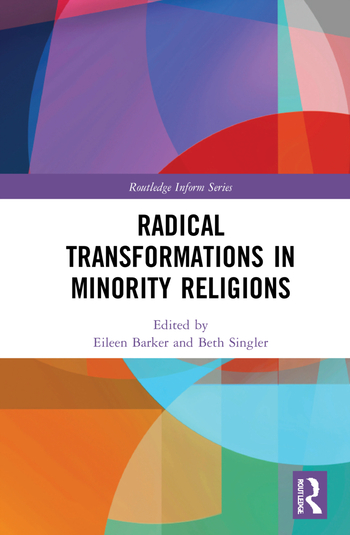Findings & Footnotes
- Less anchored in their ways than traditional religions, new religious movements (NRMs) offer a rich field for research on radical transformations. This topic is the focus of a new volume edited by Beth Singler and Eileen Barker, Radical Transformations in Minority Religions (Routledge, $160). Its 17 chapters cover a varied landscape, from themes such as reactions to child sexual abuse in three new religions to various Pagan movements, the Plymouth Brethren, the Church Universal and Triumphant, and Samael Aun Weor’s Gnostic Movement, to name but a few. There is even a chapter attempting to apply the NRM framework to consider LGBT Muslim groups. Faced with such a variety of cases, initial reflections by Beth Singler offer a general perspective. From one movement to another, sources of changes may be diverse, ranging from more obvious ones, such as societal pressure, to new revelations or generational changes. But one should also pay attention to other factors, such as transnational diaspora and transcultural appropriation in the case of Brazilian Santo Daime, examined by Andrew Dawson. When changes are brought about in part by external pressure, or the criticism of former members, questions are raised as to whether those changes express “genuine revisionism” or rebranding as part of a quest for legitimacy.These questions are at the core of the chapter by Bernard Doherty and Laura Dyason on the Plymouth Brethren Christian Church in Australia under Bruce D. Hales (2002–2016). The Brethren in Australia comprise a sizable religious minority of around 15,000 members. This chapter is followed by an appendix of three pages with a response provided by the Brethren themselves in order to show that, “whilst responding to the challenges and changing conditions of the modern day,” the Brethren actually “seek to remain true to their core beliefs and Christian values as maintained since J. N. Darby’s time.” This illustrates well how the issue of change in itself may be a sensitive one. In cases of movements formed around the experiences of their founders, it may happen that the entire community will experience successive changes following the evolving understanding of the spiritual master. Such has been the case with revisions in the Enlighten Next movement formed around Andrew Cohen, as explained by André van der Braak: “From his initial experience-based emphasis on personal enlightenment, Cohen went to an ethics-based emphasis on living one’s life based on impersonal enlightenment and ended up envisioning the future of mankind through evolutionary enlightenment. These three teachings of enlightenment came with three models of community.” Braak comments on how various reasons may explain such changes, from psychological ones to a quest for originality or an attempt to shield oneself from criticism.


